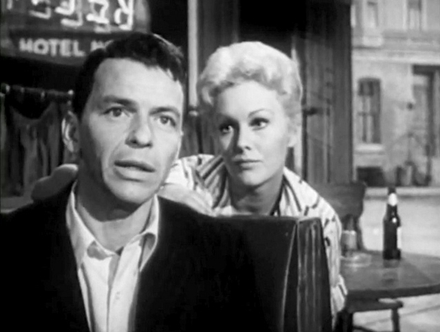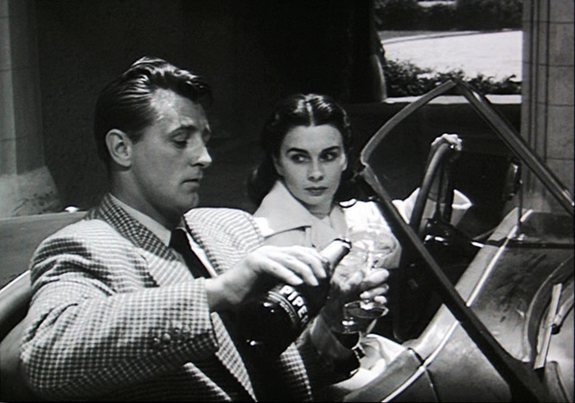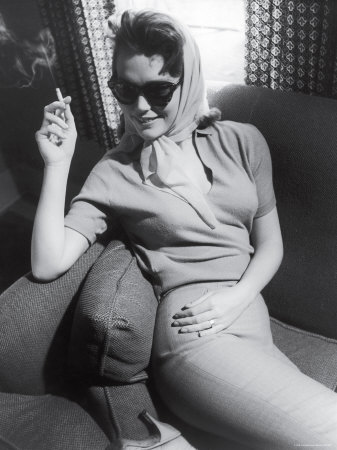By Film Noir Blonde and Mike Wilmington
The Noir File is FNB’s guide to classic film noir, neo-noir and pre-noir from the schedule of Turner Classic Movies (TCM), which broadcasts them uncut and uninterrupted. The times are Eastern Standard and (Pacific Standard).
Pick of the Week: Otto Preminger Day
His nickname was “Otto the Ogre.” He was one of the most colorful and feisty of all the star Golden Age Hollywood directors. His verbal abuse of actors, including beautiful actresses and children, was legendary. Robert Mitchum once slugged him on the set for his vile treatment of co-star Jean Simmons. (He and Mitchum later made up and even made another film together, with Marilyn Monroe.) But Otto Preminger – known for his hot temper, thick German accent, bald bullet head, defiance of taboos and long camera takes – was also one of the czars of film noir in the 1940s and early ’50s, when he directed classics like “Laura,” “Where the Sidewalk Ends” and “Angel Face.” Later on, he made one of the best of all trial dramas, 1959’s “Anatomy of a Murder,” and directed the neglected 1965 British thriller “Bunny Lake is Missing.”
Otto was the son of a renowned and well-respected attorney general in the old Austrian-Hungarian Empire (Markus Preminger). He grew up in Vienna, where, instead of the law, he became enamored of the theatre and eventually was a protégé and assistant of the legendary stage maestro Max Reinhardt. During Hitler’s rise, the Jewish Preminger emigrated to America where he fairly quickly became a notable Broadway and Hollywood director, as well as an actor who played especially nasty Nazis (as he did in Billy Wilder’s “Stalag 17“).

“The Man with the Golden Arm,” starring Frank Sinatra and Kim Novak, plays Thursday at 7:45 a.m. PST.
After his huge success directing the classic mystery “Laura” in 1944, Preminger became a 20th Century contract director and an A-lister. He was also the bane of censors and blue noses, whose limits and “rules” he constantly tested and attacked: crossing the boundaries that held back candid screen portrayals of sex, drug addiction, politics and the legal system. He had an “open” marriage and long unpublicized liaisons with both the tragic black actress Dorothy Dandridge and gilt-edged stripper Gypsy Rose Lee. He helped break the black list in 1960, by hiring Dalton Trumbo, the long black-listed scriptwriter who used aliases on his ’50s screenplays, to write “Exodus” (1960) under his real name.
Some serious critics, offended by what they saw as his publicity-mongering, tended to dismiss him as a phony, except in France, where he was one of the admired auteurs of the Cahiers du Cinema crowd. Preminger’s greatest years, 1959 to 1965, when he produced and directed a series of epic bestseller adaptations on big political and social themes, were succeeded by a decade in which his movies were almost all mercilessly savaged by critics and ignored by the public. His nadir, in 1968, was an unfunny pseudo-hip Jackie Gleason prison comedy called “Skidoo,” in which everyone took LSD, Groucho Marx played God, and all the credits were sung. I like Preminger, but words fail me.
He was a stylist. Perhaps because of his lifelong love of the theater, he liked to shoot his scenes in extremely long takes; he once said that, ideally, every film should be made in one unbroken shot. Late in his career, from the 1967 movie “Hurry Sundown” on, reviewers tended to beat up on him. But Otto the Ogre, in public, never lost his acerbic tongue, his feistiness or his capacity for verbal abuse until the end, when he died of cancer and Alzheimer’s disease at 80. Late in his life, he was interviewed about his contributions to film noir, and he professed to have no idea what film noir was, and proceeded to ridicule, abuse and hector his interviewer. That was pure Preminger — and Mitchum wasn’t there to slug him.
9 a.m. (6 a.m.) “Angel Face” (1953, Otto Preminger). Robert Mitchum and Jean Simmons tumble into one of those awful noir twisted affairs, where a nice handsome guy is entrapped by an evil, obsessed, gorgeous woman who won’t take “no” or even “maybe,” for an answer. She’s a rich spoiled girl, he’s a straight-arrow ambulance driver and Herbert Marshall is also one of her victims. In the ’50s, critic-cineaste Jean-Luc Godard put “Angel Face” on his Cahiers du Cinema list of the Ten Best American Sound Films, along with another classic film noir: Orson Welles’ ‘The Lady from Shanghai.” And yes, this is the movie where Mitchum decked Preminger.
10: 45 a.m. (7:45 a.m.): “The Man with the Golden Arm” (1955, Preminger). With Frank Sinatra, Kim Novak and Eleanor Parker. Reviewed in FNB on November 10, 2012.
12:45 p.m. (9:45 a.m.): “Anatomy of a Murder” (1959, Preminger). With James Stewart, Lee Remick, Ben Gazzara and George C. Scott. Reviewed in FNB on March 14, 2012.
3:30 p.m. (12:30 p.m.): “Advise and Consent” (1962, Preminger). This star-studded, non-flag-waving adaptation of Allen Drury’s political novel about a fiercely contentious U.S. Senate confirmation battle has a stellar cast that includes Henry Fonda, Charles Laughton, Don Murray, Walter Pidgeon, Gene Tierney, Burgess Meredith and Franchot Tone — and it may not exactly be classic pure film noir.
But, shot by Preminger in knife-sharp black and white on actual government and Washington D.C. locations with the co-operation of the Kennedy White House — it looks like noir, feels like noir, and is as murderously frank and coolly unabashed about taboo subjects as “Double Indemnity” or “The Maltese Falcon.“ Preminger, a liberal director filming Drury’s very conservative novel, shows us D. C.‘s dirtiest linen in one of the nastiest, most vicious mud-slinging confirmation battles ever.
6 p.m. (3 p.m.): “Bunny Lake is Missing” (1965, Preminger). With Laurence Olivier, Carol Lynley and Noel Coward.
Friday, Nov. 6
6 a.m. (3 a.m.): “The Testament of Dr. Mabuse” (1933, Fritz Lang). With Rudolf Klein-Rogge and Otto Wernicke . Reviewed in FNB on October 13, 2012.
8:45 a.m. (5:45 a.m.): “Blackmail” (1929, Alfred Hitchcock). With Anny Ondra, Cyril Ritchard and Sara Allgood. Reviewed in FNB on April 4, 2013.
10:15 a.m. (7:15 a.m.): ”The Informer” (1935, John Ford). With Victor McLaglen, Heather Angel and Preston Foster. Reviewed in FNB on December 12, 2012.
12 a.m. (9 p.m.): “Casablanca” (1942, Michael Curtiz). With Humphrey Bogart, Ingrid Bergman, Claude Rains, Paul Henried, Sydney Greenstreet and Peter Lorre. Reviewed in FNB on August 8.
Saturday, Nov. 7
8:45 a.m. (5:45 a.m.) “He Ran All the Way” (1951, John Berry). John Garfield, as a sexy bad guy on the lam terrorizes a family and tries to seduce Shelley Winters. (Tries?) Hard core noir and Garfield’s last movie. With Norman Lloyd and Wallace Ford.
8 p.m. (5 p.m.): “Key Largo” (1948, John Huston). With Humphrey Bogart, Edward G. Robinson, Lauren Bacall and Claire Trevor. Reviewed in FNB on August 10, 2012.
Tuesday, Nov. 10
12 p.m. (9 a.m.): “Leave Her to Heaven” (1945, John M. Stahl). With Gene Tierney, Cornel Wilde and Vincent Price. Reviewed in FNB on August 26, 2013.
8 p.m. (5 p.m.): “Kind Hearts and Coronets” (1949, Robert Hamer). With Dennis Price, Alec Guinness and Valerie Hobson. Reviewed in FNB on Oct. 27, 2012.












From FNB readers